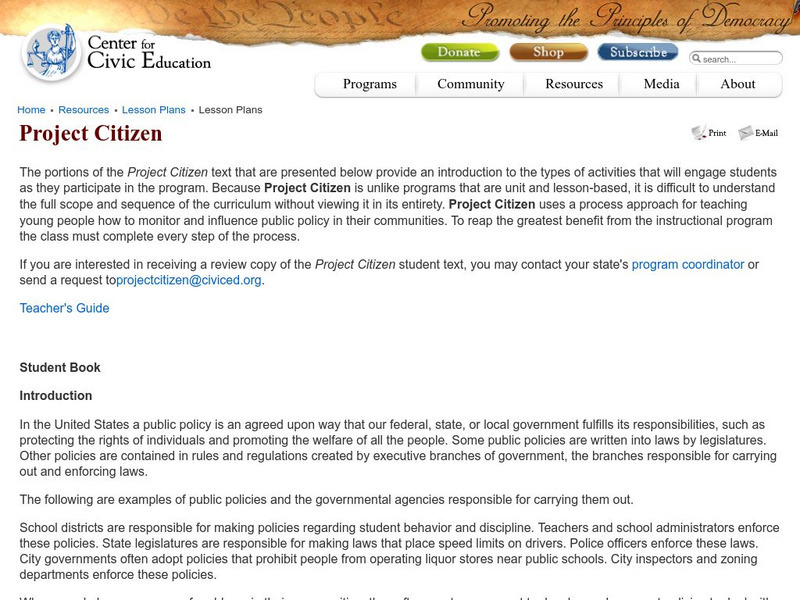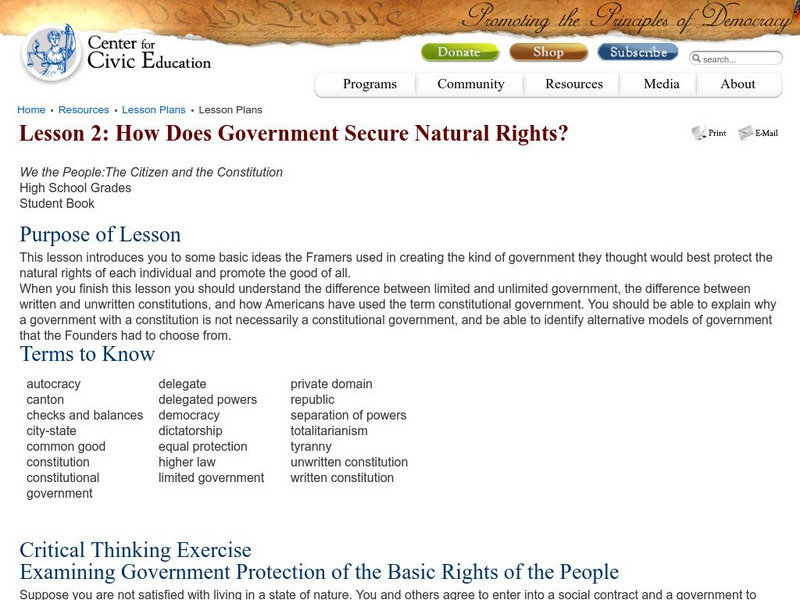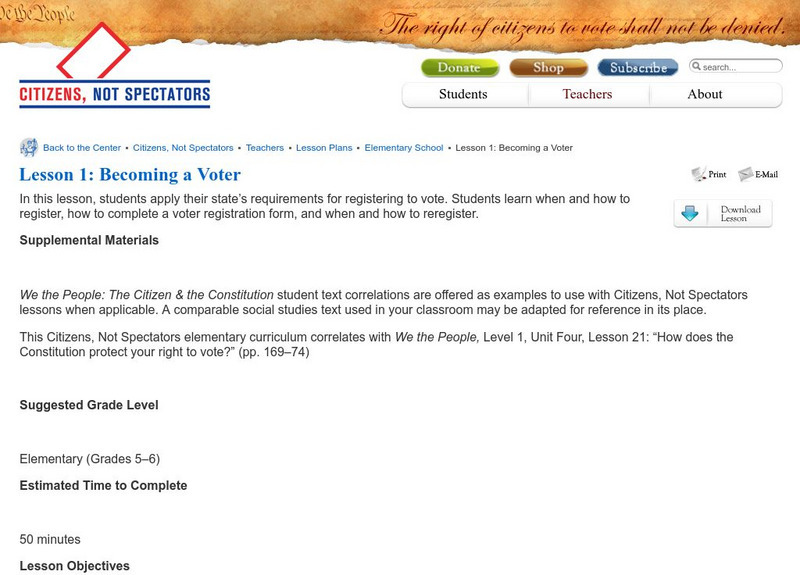Smithsonian Institution
Smithsonian Learning Lab: Wwii on the Home Front: Civic Responsibility
Smithsonian Education presents a lesson covering the WWII's propaganda program which enforced the ideals of Civic Responsibility. Provides eight pages of poster examples, detailed background over the time period, and the goals of the...
Center For Civic Education
Center for Civic Education: Project Citizen
This project is intended to help students learn how to express their opinions, and how to decide which level of government and which agency is most appropriate for dealing with a problem they identify. They then gather relevant...
Center For Civic Education
Center for Civic Education: We the People: Project Citizen
This detailed lesson has students examining their community. The students then have class discussions, assignments and a portfolio to complete. A separate teacher site is available.
Center For Civic Education
Center for Civic Education: How Does Government Secure Natural Rights?
This lesson introduces students to some basic ideas the Framers used in creating the kind of government they thought would best protect the natural rights of each individual and promote the good of all. At the end of the lesson, students...
iCivics
I Civics: Colonial Influences
Where did the American colonists get their ideas that lead to a revolution and a whole new kind of government? This lesson explores the Magna Carta, Mayflower Compact, English Bill of Rights, Cato's Letters, and Common Sense.
iCivics
I Civics: Mini Lesson: Gerrymandering
Students will try their hand at a simplified districting exercise and learn about the common gerrymandering practices of packing and cracking districts. Students then explore the media's traditional roles as gatekeeper, agenda-setter,...
iCivics
I Civics: Mini Lesson: Filibusters
Students learn about filibusters and how and why senators use them, then they take a look at how news coverage of a filibuster can be transformed through neutral, positive, or negative framing.
iCivics
I Civics: Mini Lesson: Executive Orders
Students discover how presidents use executive orders to wield power and how the legislative and judicial branches support and challenge these measures.
iCivics
I Civics: Foreign Policy: War & Peace and Everything in Between
Students learn the distinction between foreign and domestic policy and what role the executive branch plays in foreign policy and the primary tools it uses: foreign aid, the military, and treaties.
iCivics
I Civics: Government & the Economy
Students learn how government and the economy are related and the difference between market, command, and mixed economies.
iCivics
I Civics: Banks, Credit & the Economy
This lesson focuses on the relationship between money, banks, and lending in our economy.
iCivics
I Civics: Mini Lesson: Midterm Elections
Students will learn about the midterm election, its role as a referendum on the presidency, and how a shift in party control impacts the legislative and executive branches.
iCivics
I Civics: Trial Court Simulation
Learners learn the vocabulary and process of small claims court and have the chance to play plaintiff, defendant, judge, and jury in this simulation. The lesson is complete with witness statements, evidence, a trial script, and jury...
iCivics
I Civics: Get Counted! (The u.s. Census)
In this instructional activity, students learn the who, what, when, where, why, and how of the census. Students explore the importance of being informed and how the census impacts their communities.
iCivics
I Civics: The Great State
In this overview lesson, students learn about state government structure, functions, lawmaking, and relationship with local government.
iCivics
I Civics: The Market Economy
This lesson teaches the basics about the market economy, including the relationships between consumers and producers, supply and demand, and profit and incentive. Students learn six traits of a market economy, compare the market economy...
iCivics
I Civics: Voting in Congress
n this lesson, students learn what factors members of Congress consider when deciding whether to vote for a bill, including the powers given to Congress by the Constitution, what a member's constituents want, his or her political party's...
Center For Civic Education
Center for Civic Education: Becoming a Voter
In this lesson, young scholars apply their state's requirements for registering to vote. Students learn when and how to register, how to complete a voter registration form, and when and how to reregister.
Center For Civic Education
Center for Civic Education: Becoming a Voter
In this lesson, students apply their state's requirements for registering to vote. Students learn when and how to register, how to complete a voter registration form, and when and how to reregister.
Center For Civic Education
Center for Civic Education: Becoming a Voter
In this lesson, students apply their state's requirements for registering to vote. Students learn when and how to register, how to complete a voter registration form, and when and how to reregister.
Center For Civic Education
Center for Civic Education: The Ballot and Questions
This lesson plan focuses on a voter's need to be fully informed prior to casting a vote on Election Day and how to acquire the necessary information.
iCivics
I Civics: Columbus to the Colonies
From the time Columbus first set foot in the New World, Europeans were fascinated with this new land. In this lesson, students learn about the Three Gs that drove them here- gold, God, and glory- and find out how these settlers gave...
iCivics
I Civics: Rousseau Mini Lesson
Explore the ideas of Enlightenment thinker, Jean-Jacques Rousseau. His writings on natural and social freedom, the social contract, and democracy shaped the American system of government in a variety of ways.
Other popular searches
- Civics and Economics
- Introduction to Civics
- Social Studies Civics
- Civics Political Cartoons
- Civics Project
- Civics Lesson Plans
- American Civics
- Civics Business
- Civics Civil War
- Civics Citizen
- U.s. American Civics
- Civics 2008 Election









